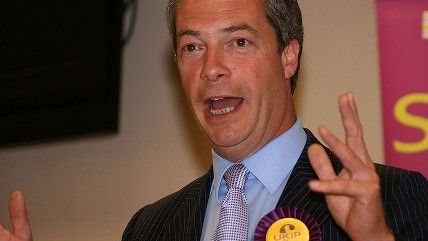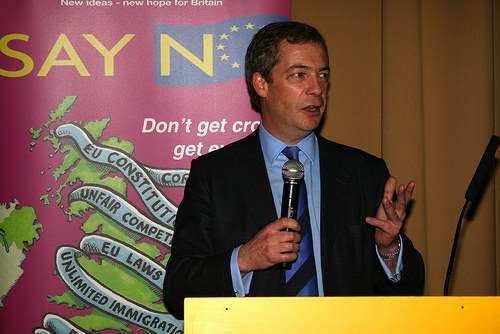British Eurosceptics Make Gains in Local Elections


The United Kingdom Independence Party (UKIP) has won almost a quarter of the vote in the council elections held in England and Wales. The Conservatives and Liberal Democrats, the two governing parties, both lost councilors while Labour gained .
UKIP, the U.K.'s largest eurosceptic party, has been causing the Conservatives some grief recently after failing to adequately address the U.K.'s relationship with the European Union.
In a speech earlier this year Prime Minister David Cameron tried to appease some of the fears some Conservatives have about the EU by giving a speech in which he promised that the British would be offered an in/out referendum on EU membership, but only after the next general election. The speech was criticized by UKIP's leader, Nigel Farage, who rightly pointed out that waiting until after the next general election, scheduled for 2015, is too long.
Although local councils in England and Wales have limited influence on national politics the result is an indication of how the British public are feeling about the state of their country. UKIP do not have any Members of Parliament and as so have no influence over national policy. However, as British historian Timothy Stanley has pointed out, Farage views the role of UKIP as a party that can nudge other parties in his preferred direction:
But the big story is the rise and rise of a tiny party once derided by its critics as full of fruitcakes and closet racists. It probably won't gain any parliamentary seats in 2015: the electoral system is stacked against it and while Ukip's support is broad, it isn't deep enough in individual constituencies to win anything. This doesn't seem to trouble Nigel Farage who says that he sees his party as playing the same role that the SDP played in the 1980s – driving the political agenda in his preferred direction. That statement could cause some controversy within Ukip because the party is split over whether it's a pressure group or a serious candidate for government. Farage is correct that its best shot at relevance comes from posing as the former, but the taste of victory in this round of elections could delude many activists that they stand a chance of becoming the latter. Success breeds success, but also hyperbole and vanity.
David Cameron and the Conservative leadership need to rethink their approach on the U.K.'s membership of the European Union. The eurosceptic party Cameron once referred to as "fruitcakes" have done well in local elections, and while it is unlikely they will gain seats in the House of Commons at the next general election they could poach Conservative voters.
Given that the eurozone is expected to contract more than expected in the coming year, and that only a third of Britons want to remain in the European Union it might be worth Cameron holding a referendum on EU membership before the next general election. Such a move would help limit the influence of UKIP and appease many eurosceptic Conservatives who would like to leave the EU.
